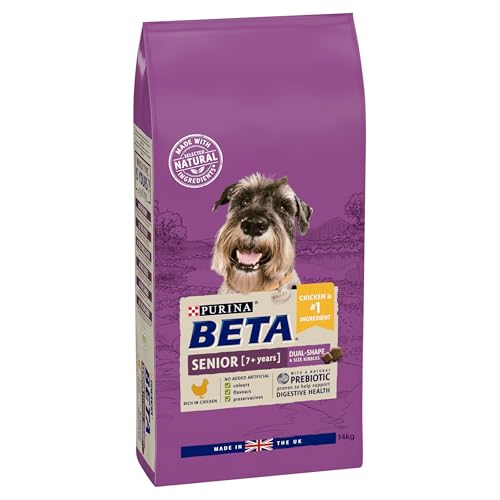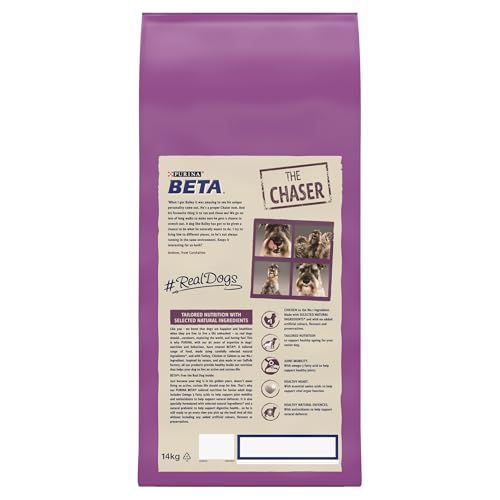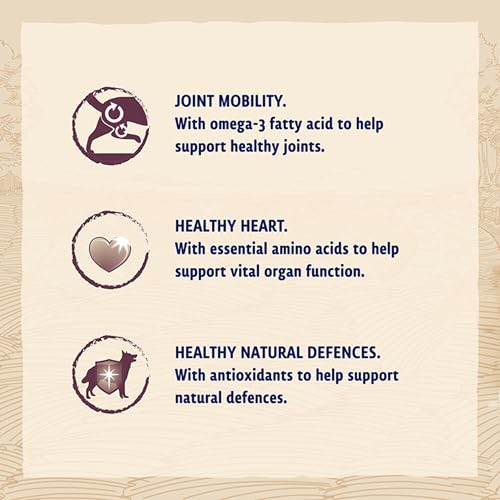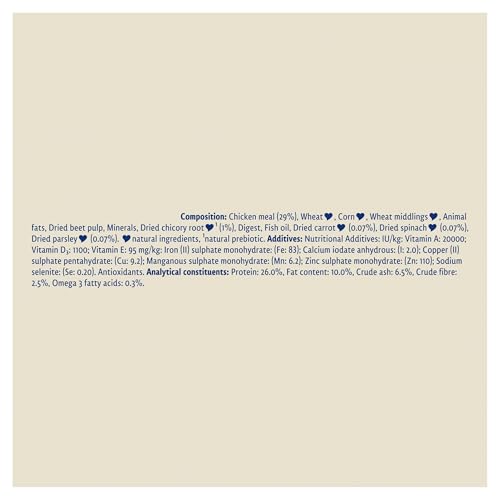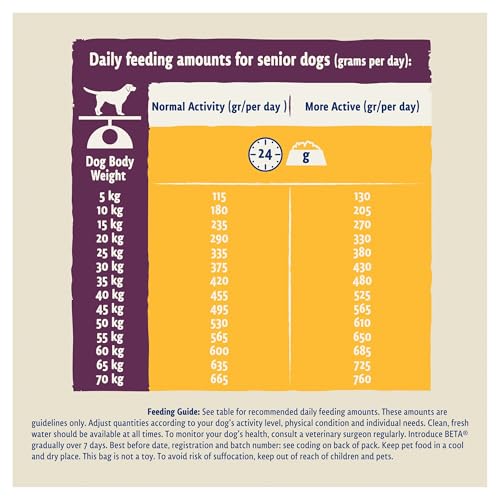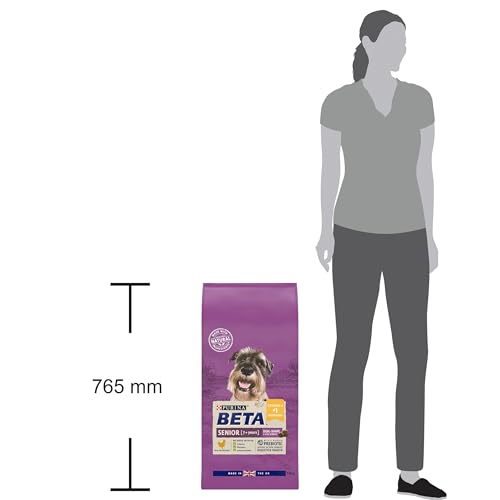
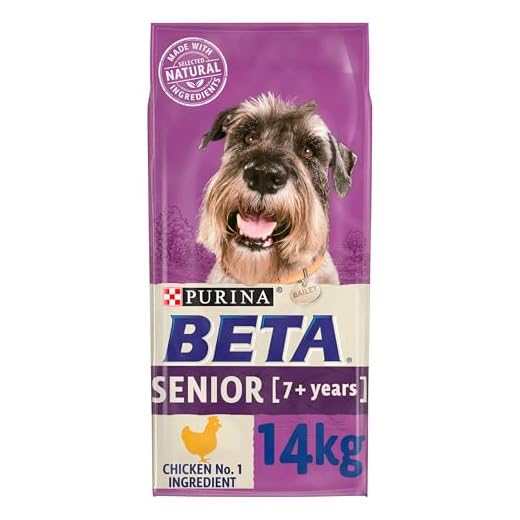



When it comes to caring for our older canine companions, finding the right nutrition becomes paramount, especially if they suffer from allergies. As dogs age, their dietary needs evolve, and allergies can complicate their nutritional requirements. In this article, I will share my insights on selecting the best food for senior dogs with allergies, focusing on specific ingredients and formulations that cater to their unique needs.
It’s crucial to understand that allergies in older dogs can manifest in various ways, such as skin irritations, digestive issues, or respiratory problems. Therefore, choosing the right food can significantly improve their quality of life. In my experience, the first step is to identify common allergens and opt for hypoallergenic recipes that are gentle on their system.
One key aspect to consider is the source of protein. Many senior dogs with allergies benefit from novel protein sources like duck, venison, or fish, which are less likely to trigger allergic reactions. Additionally, grain-free diets or those with limited ingredients can help minimise exposure to potential allergens. I always recommend checking the ingredient list carefully to ensure it meets your pet’s specific needs.
Furthermore, senior dogs often require additional support for joint health, digestive function, and immune system strength. Foods fortified with omega-3 fatty acids, glucosamine, and probiotics can provide these benefits while also being suitable for sensitive stomachs. In the following sections, I will delve deeper into the best choices available and what to look for when selecting food for your senior dog with allergies.
Understanding Allergies in Senior Canines
As our beloved pets age, their bodies undergo various changes, and some of these can make them more susceptible to allergies. This increased sensitivity can manifest in different ways, making it crucial to recognise the signs early and address them appropriately. Over the years, I’ve seen how important it is to understand these changes to provide the best care possible for our senior companions.
One of the primary challenges with ageing pets is their immune system, which becomes less robust over time. This can lead to an increased likelihood of allergic reactions, whether from environmental factors, certain ingredients in their meals, or even new products they encounter. By identifying and managing these allergens, we can significantly improve their quality of life.
Common Signs of Allergies in Older Pets
It’s essential to be vigilant and look out for specific symptoms that may indicate an allergic reaction. Here are some common signs to watch for:
- Skin Issues: Redness, itching, and frequent scratching can be tell-tale signs. In severe cases, you might notice hair loss or hot spots.
- Digestive Problems: Vomiting, diarrhoea, and excessive gas can indicate that something in their diet isn’t agreeing with them.
- Respiratory Symptoms: Sneezing, coughing, and difficulty breathing might point towards an environmental allergen.
When these symptoms appear, it’s essential to consult with a vet to determine the underlying cause. An accurate diagnosis will help in formulating an effective treatment plan, which might include dietary changes, medication, or other interventions tailored to the specific needs of your senior canine.
Key Nutritional Needs for Older Canines with Sensitivities
As our four-legged companions grow older, their dietary requirements change to accommodate the natural ageing process and any health concerns that may arise. Understanding these needs is crucial to ensure they continue to lead happy and healthy lives. One of the most important aspects to consider is the balance of essential nutrients that can support their overall well-being, particularly when dealing with sensitivities or intolerances.
Older pets often benefit from a diet tailored to their specific health conditions. For instance, if a senior canine has sensitivities, it’s vital to select ingredients that are both gentle on their digestive system and nourishing. This approach helps maintain their energy levels, coat condition, and immune function while avoiding any adverse reactions.
Essential Nutrients for Aged Companions
When selecting sustenance for an older canine, certain nutrients become more critical to address age-related issues and sensitivities:
- High-Quality Protein: Vital for maintaining muscle mass and supporting a healthy immune system, especially when digestion becomes less efficient with age.
- Healthy Fats: Omega-3 and Omega-6 fatty acids are essential for joint health, reducing inflammation, and keeping the coat shiny and skin supple.
- Fibre: Important for digestive health, fibre helps prevent constipation and promotes a healthy gut, which can be particularly beneficial for older dogs with digestive sensitivities.
- Antioxidants: These help combat oxidative stress and support the immune system, which can be especially beneficial as the body ages.
- Vitamins and Minerals: Ensuring an adequate intake of vitamins and minerals such as vitamin E, B vitamins, and calcium is crucial for overall health and vitality.
By focusing on these essential nutrients, you can help your senior companion thrive, even in the face of dietary sensitivities. Tailoring their diet to meet these specific needs can make a significant difference in their quality of life and overall well-being.
Recognising Typical Triggers in Canine Meals
When considering what to feed our older companions who suffer from sensitivities, it’s essential to understand the common triggers present in various meals. Identifying and avoiding these elements can significantly improve the wellbeing of our furry friends, allowing them to enjoy their golden years comfortably.
Several elements are frequently linked to adverse reactions in canine diets. By knowing what these are, we can make more informed decisions and select meals that are less likely to provoke an allergic response in our pets.
Ingredients Commonly Linked to Adverse Reactions
- Beef: Despite being a popular choice in many commercial meals, beef is a frequent cause of sensitivities in dogs.
- Dairy: Many dogs struggle to digest dairy products, leading to gastrointestinal issues and other allergic reactions.
- Wheat: Wheat and other grains are common culprits, often causing itchy skin and digestive problems.
- Chicken: Another prevalent ingredient in dog food, chicken, can sometimes be a source of allergic reactions.
- Soy: Soy is used as a protein source in many dog foods but can lead to intolerance in some pets.
- Eggs: While nutritious, eggs can be a trigger for allergies in some dogs.
- Corn: Often used as a filler in dog food, corn can cause issues for dogs with sensitivities.
By understanding these common triggers, we can better navigate the plethora of options available and choose meals that cater specifically to the needs of our senior dogs. It’s always beneficial to consult with a veterinarian to tailor a diet plan that ensures the health and happiness of our pets.
Identifying the Most Suitable Ingredients for Older Dogs with Allergies
When caring for a senior canine companion with dietary sensitivities, it’s crucial to choose ingredients that support their overall health without triggering adverse reactions. Through careful selection, we can ensure that our pets receive the nutrition they need while avoiding potential allergens.
Over the years, I’ve learned that the ingredients we select play a significant role in managing our pets’ sensitivities. Understanding which components are beneficial and which ones to avoid can make all the difference in maintaining their wellbeing.
Key Ingredients for a Balanced Diet
When it comes to choosing the right components for an older pet’s diet, some ingredients stand out for their nutritional benefits and low allergenic potential. Here are a few options:
- Hypoallergenic Proteins: Opt for novel proteins such as duck, venison, or fish. These sources are less likely to cause reactions compared to common proteins like chicken or beef.
- Whole Grains and Alternatives: Brown rice, sweet potatoes, and quinoa are excellent carbohydrate choices. They provide essential energy while being gentle on the digestive system.
- Omega-3 Fatty Acids: Ingredients rich in omega-3s, such as flaxseed and fish oil, can help reduce inflammation and promote healthy skin and coat.
- Fruits and Vegetables: Including a variety of fruits and vegetables can provide essential vitamins and minerals. Blueberries, spinach, and carrots are particularly beneficial.
By incorporating these ingredients into your pet’s diet, you can help manage their allergies while ensuring they receive the nutrients they need for a healthy life.
Recommended Brands for Mature Dogs with Allergies
When it comes to selecting the right meals for our senior pets who suffer from sensitivities, it is crucial to be well-informed. There are several brands that cater specifically to older dogs with dietary restrictions, providing them with nutritious and balanced options that help alleviate allergy symptoms.
As a responsible pet owner, I have explored various products and found a few standout brands that consistently deliver high-quality ingredients tailored for older dogs with allergies. These brands prioritise hypoallergenic formulas, ensuring that our furry companions receive the best care possible.
Noteworthy Brands for Sensitive Senior Pets
-
Hill’s Prescription Diet: This brand offers specialised products designed to address various health issues, including allergies. Their recipes often include limited ingredient diets that help identify and avoid specific allergens.
-
Royal Canin: Known for their veterinary-approved formulas, Royal Canin has options specifically crafted for older dogs with sensitive stomachs and skin. Their products often feature novel proteins and carefully selected carbohydrates.
-
Blue Buffalo: Blue Buffalo’s Freedom line is an excellent choice for those seeking grain-free and limited ingredient options. Their senior formulas focus on providing essential nutrients while avoiding common allergens.
-
Wellness Simple: Wellness Simple offers limited ingredient diets that are perfect for senior dogs with food sensitivities. Their products are formulated with a single source of protein and easily digestible carbohydrates.
-
Natural Balance: This brand is renowned for its allergy-friendly recipes that cater to dogs of all ages. Their senior formulas are designed to be gentle on the digestive system while providing complete nutrition.
Choosing the right brand for your mature pet with allergies can significantly improve their quality of life. By focusing on hypoallergenic and carefully crafted formulas, we can help our dogs enjoy their golden years comfortably and healthily.
Homemade Recipes for Older Dogs with Allergies
As our canine companions age, their dietary needs often change, especially if they’re dealing with sensitivities or adverse reactions to certain ingredients. Preparing meals at home can be a wonderful way to ensure that their nutrition is tailored specifically to their needs, using safe and wholesome ingredients.
In this section, I’ll share some of my favourite recipes that are designed to be gentle on your pet’s system while providing all the necessary nutrients. These recipes avoid common allergens and are easy to prepare, making them perfect for those who want to take a hands-on approach to their pet’s diet.
Simple and Nutritious Meals
- Chicken and Sweet Potato Delight: Combine cooked, shredded chicken breast with mashed sweet potatoes and a small amount of steamed green beans. Sweet potatoes are a great source of fibre and vitamins, while chicken provides lean protein.
- Salmon and Quinoa Feast: Mix cooked salmon with quinoa and some finely chopped carrots. Salmon is rich in omega-3 fatty acids, beneficial for joint health, and quinoa is a protein-packed grain that’s easy to digest.
- Turkey and Brown Rice Medley: Combine ground turkey with cooked brown rice and steamed broccoli. Turkey is another excellent source of protein, and brown rice offers a hypoallergenic grain option that’s gentle on the stomach.
Remember, it’s always a good idea to consult with your vet before making significant changes to your pet’s diet, especially if they’re older or have specific health conditions. By creating homemade meals, you can better control what goes into your pet’s bowl, ensuring they’re eating the best possible food tailored to their needs.
Switching Your Senior Canine to a New Meal Plan
When it comes to introducing a different diet for our elderly pets, a methodical approach is essential. Abrupt changes can lead to digestive upset and resistance from your pet. Instead, gradually incorporating the new meal plan can ease the transition and ensure acceptance.
Begin by mixing a small portion of the new food with their current meals. Over the course of a week or two, increase the proportion of the new food while decreasing the old one. This slow introduction allows their digestive system to adjust and helps to prevent gastrointestinal issues.
Steps for a Smooth Transition
- Start Small: Initially, add just a small amount of the new food to their existing diet.
- Monitor Response: Watch for any signs of discomfort or allergies, such as itching or upset stomach.
- Gradual Increase: Slowly increase the amount of the new food over 7-14 days, reducing the old food accordingly.
- Maintain Consistency: Feed your pet at the same times each day to maintain a routine.
If you notice any adverse reactions, revert to the previous diet and consult with a veterinarian. Each pet is unique, and what works for one may not suit another. Patience and careful observation are key to a successful transition.
By following these steps, we can help ensure our senior companions adapt comfortably to their new nutritional regimen, promoting their health and wellbeing.
Tips for Managing Allergies in Senior Dogs
Managing allergies in senior dogs requires careful attention to their diet, environment, and overall health. Here are some tips to help alleviate your senior dog’s allergy symptoms:
1. Consult with Your Veterinarian: Before making any changes to your dog’s diet or medication, consult with your veterinarian to determine the best course of action.
- Discuss your dog’s symptoms and medical history.
- Consider allergy testing to identify specific triggers.
2. Adjust Their Diet: Switching to a hypoallergenic diet can help reduce allergic reactions. Look for dog foods that are free from common allergens such as wheat, soy, and dairy.
- Consider novel protein sources like duck or venison.
- Avoid artificial additives and preservatives.
3. Control Their Environment: Reduce exposure to allergens in your dog’s environment to minimize symptoms.
- Keep your home clean and dust-free.
- Wash your dog’s bedding regularly.
- Consider an air purifier to remove allergens from the air.
4. Monitor Their Symptoms: Keep a close eye on your dog’s symptoms and note any changes or improvements. This information will be valuable when discussing treatment options with your vet.
5. Consider Supplements: Some supplements, such as omega-3 fatty acids and probiotics, may help support your dog’s immune system and reduce inflammation associated with allergies.
6. Be Patient and Consistent: Managing allergies in senior dogs can be a long-term process. Be patient and consistent with their treatment plan, and don’t hesitate to reach out to your vet for guidance.
Best Dog Food For Seniors With Allergies
Features
| Part Number | 12274093 |
| Model | TP-7613035152908_Vendor |
| Release Date | 2015-08-24T00:00:01Z |
| Size | 11 kg (Pack of 1) |
| Language | Spanish |
| Price history for Hypoallergenic Dry Dog Food for Allergies | |
|---|---|
|
Latest updates:
|
|
Features
| Part Number | 12231689 |
| Model | 12531980 |
| Color | transparent |
| Release Date | 2014-05-23T00:00:01Z |
| Size | 1 count (Pack of 1) |
Features
| Part Number | 81378272 |
| Model | 81378272 |
| Release Date | 2012-04-23T00:00:01Z |
| Size | 12 kg (Pack of 1) |
| Language | English |
Features
| Part Number | 29046 |
| Model | 02SKFTLS |
| Warranty | 1 year manufacturer |
| Size | 1 count (Pack of 1) |
| Language | English |
| Price history for Light and Senior Dog Food for Active Dogs | |
|---|---|
|
Latest updates:
|
|
Features
| Part Number | HARRGFSS-12 |
| Model | HARRGFSS-12 |
| Release Date | 2024-01-01T00:00:01Z |
| Size | 12 kg (Pack of 1) |
| Price history for Grain-Free Salmon & Veg Dry Dog Food | |
|---|---|
|
Latest updates:
|
|
Features
| Is Adult Product | |
| Release Date | 2025-05-17T00:00:01Z |
| Language | English |
| Number Of Pages | 213 |
| Publication Date | 2025-05-17T00:00:01Z |
Q&A:
What should I consider when choosing the best dog food for seniors with allergies?
When choosing dog food for seniors with allergies, consider their specific allergies, age-related dietary needs, and any other health conditions they may have. Look for hypoallergenic formulas that avoid common allergens such as wheat, soy, and corn.
How can I tell if my senior dog has allergies?
Symptoms of allergies in senior dogs can include itching, redness or inflammation of the skin, ear infections, gastrointestinal issues like vomiting or diarrhea, and respiratory problems. Consult your vet for a proper diagnosis.
What are some common allergens in dog food?
Common allergens in dog food include beef, chicken, dairy, eggs, corn, wheat, and soy. Artificial additives and preservatives can also trigger allergic reactions in some dogs.
Are there any specific ingredients I should look for in dog food for seniors with allergies?
Look for dog foods that are specifically labeled as hypoallergenic or limited ingredient diets. These formulas often contain novel protein sources like duck, venison, or salmon, and easily digestible carbohydrates like sweet potatoes or peas.
Should I consult my vet before switching my senior dog to a new diet for allergies?
Yes, it’s always a good idea to consult your vet before making any changes to your senior dog’s diet, especially if they have allergies. Your vet can help you choose the best food and ensure that it meets your dog’s nutritional needs.












